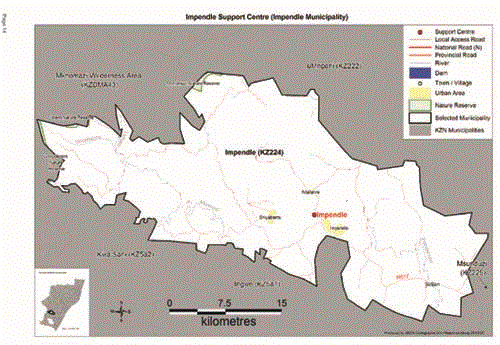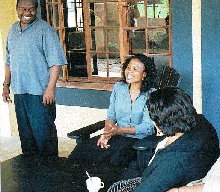Coordinator: Zodwa Maramane. Zodwa has worked for CCJ since 1999. 
Contact: 072 917 2455 (tel), 033 996 0462 (fax)
Email: impendle.ccj@gmail.com
Most common cases: Domestic violence and labour issues
Areas served: These include Impendle ward, Stoffelton, Loteni, Gomane, Nhlabamkhosi, Novuka, Ntokozweni, Khetha, Mqabulagudu, Lindokuhle, Phindangeni, Similo, Sikesuthi, Mackson, eMadiphini, Brington, Ukukhanya, Umgodi, Ntshiyabantu, Nguga, Inzinga and Makhuzeni.
Description: Impendle support centre (below) is at the magistrate’s court, next to a police station and other facilities in the village.

The area is characterised by stark poverty and lack of infrastructure such as running water and reliable roads, which are impassable when wet. Communities are traditional and are mainly ruled by Amakhosi and their Izinduna. Schools, clinics and other facilities are basic and sometimes difficult to reach.
In 2011, the office attended to 271 cases, with domestic violence (93) and labour issues (47) being the most common.
“After the case, I was unpopular and many people said to me, “How could you send him to prison - an old, rich respected man, who offered to pay compensation?” I told them that it was my job to enforce the law. The community learned a lesson from this case that anyone can go to jail for rape.” |
Read news from Impendle
Zodwa Maramane

How long have you worked for CCJ?
12 years
What led you to become a support centre coordinator?
I wanted to help people and work with people. I thought of becoming a teacher before I heard of this job.
What would you say is the biggest challenge facing people in your area?
The main problems are labour issues such as getting unemployment benefits, and domestic violence.
Do you think traditional culture plays a positive role in the work that you do or not?
Sometimes clients want to pay compensation for rape for example, and I tell them that this is not the law. Compensation only helps the victims’ family, who get the money. It does not help the victim.
Have you had a case when you relied on traditional customs?
In one case, some boys hurt a girl at school, but not seriously. Her family complained, and we resolved the case by telling the boys’ family pay a goat in compensation. I used customary law because the case was not serious. I mean the boys were only fooling around, they didn’t assault or sexually abuse her.
“Compensation (under traditional laws) only help the victims’ family, who get the money. It does not help the victim.” |
Would you say people's lives have changed in the time you have been here?
People’s lives are improving – they have more money now to build better houses, and their children are going on to study after high school
Who is your role model?
There is a young lady I work with, a social worker. She always does her work well, and she has never refused to help me with a case.
Are there any laws that would like to see changed?
I deal with a lot of cases to do with claiming unemployment benefit, and the problem people have is that if people don’t claim it within 3 to 6 months, they can’t get it at all. I feel the Department of Labour should change this and work more closely with people claiming unemployment benefit.
Can you describe one or two of the most satisfying cases you have dealt with?
There was a case eight years ago involving a rape of a child by a 72 year-old man who was a rich and respected figure in the community. I remember it because his mother came to me on the night it happened, because she was worried that her daughter had not come home. She had let her go with the man to help him do his shopping, because she trusted him.
We heard a child crying that evening and it was hers. We caught the man that night. He admitted everything and was sentenced to jail within three days of being caught, which is very unusual. I helped the girl to give statements to the police and this helped convict the man. He is still in jail, his sentence is eighteen years. He offered to pay compensation but I told him that this was not the law.
After the case, I was unpopular and many people said to me, “How could you send him to prison - an old, rich respected man, who offered to pay compensation?” I told them that it was my job to enforce the law. The community learned a lesson from this case that anyone can go to jail for rape. Also a lot of people came up to me and said well done. I counselled the child after the case and she is doing well now, she is in matric.
If you could change anything about your work and the people you deal with, what would it be and why?
If we had our own fax, photocopier, and computer, this would help us a lot. Also transport is a problem because the police can’t always help and the taxis take a long time to fill up and leave.